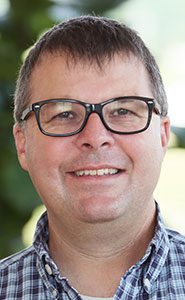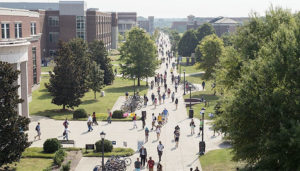By Ashley Perham
Contributing Writer, Baptist & Reflector
MURFREESBORO — If Baptists want to know what the culture will look like in the next five to 10 years, they should look at the college campus, according to Mark Whitt, campus minister at Middle Tennessee State University in Murfreesboro.
Whitt was recently featured on a Radio B&R podcast where he shared his views on campus ministry. The podcast (which is Episode 28 of Radio B&R) can be found at baptistandreflector.org/radio-br/ .
Whitt said his ministry focuses on three things: reaching MTSU students for Christ, equipping them to serve, and mobilizing them to be disciples of Christ both in college and after.
“Some of them obviously step into ministry roles, missionaries, whatever,” Whitt said. “But a majority of them are teachers and doctors and nurses. And we really emphasize that we’re mobilizing them to be followers of Christ — and disciples of Christ — once they leave this place.”
While MTSU is one of the larger campuses in the state, with 23,000 students, only around 3,000 of them live on campus, according to Whitt.
The commuter campus atmosphere is a challenge for both Whitt’s BCM ministry and for students looking for community on their campus, Whitt said.
“So many students come here, they take class, and then they’re gone. They’re off to their jobs, they’re off to an hour commute from here. Whatever it may be,” Whitt explained.
For Whitt, it is important for students to find Christian community on their campus in order to help them thrive in their walk with Christ and lay a strong foundation for their future.
“Once they get beyond the college campus and they’ve developed some of those disciplines of following Christ on a daily basis, then they’re going to find those churches and be involved with those,” Whitt said. “They’re going to lead their family differently.”
One way Whitt’s ministry tries to help students thrive in their Christian walk is through equipping them to be leaders in the ministry through leadership teams.
“On a college campus, it’s one of the largest mission opportunities, largest places for them to see that it’s really a dichotomy of our culture, of our city, right here,” Whitt said.
“We’re a small city in itself. And so to help them understand what that looks like to be a leader on our campus and a leader in our ministry, we’re helping to equip them in that area.”
With over 300,000 university students in Tennessee, many of which are internationals, Whitt says he thinks college campuses are the most strategic places Baptists can be.
Whitt encouraged parents to help their children find Christian community on the campuses they visit: “When they visit a college campus for a college visit, make it an intentional part of going to visit a local church, visit one of the BCMs,” Whitt said.
Whitt concluded by talking about what drives him to do ministry: seeing college students embrace being followers of Christ.
“They come and tell me about the conversations that they’re having with their friends … they show me a text of a friend that they’ve been sharing the gospel with and having those conversations. That’s what brings me so much joy,” Whitt said. “That’s what drives me.”
Whitt shared a story of a college student he ministered to at Murray State University in Kentucky. He “epitomized freshmen” when he first came to campus, but he ended up serving with the IMB Journeyman program, going to seminary, and becoming a missionary in Southeast Asia.
“I watched a young man just fully embrace what it meant to be a follower of Christ,” said Whitt. “He let God just shape him, and he was obedient. And so I got to walk with him through that. That’s the joy of what we get to do every day. We see life change every day.”
Collegiate ministry is unique in that campus ministers really do “do life” with students, Whitt said. Parents can have confidence that their child will have an advocate on the college campus, thanks to the support of the Baptist church.
“I’m so thankful for Tennessee Baptists and their giving through the Golden Offering and the Cooperative Program to allow us to do what we do on college campuses every single day,” Whitt concluded.


